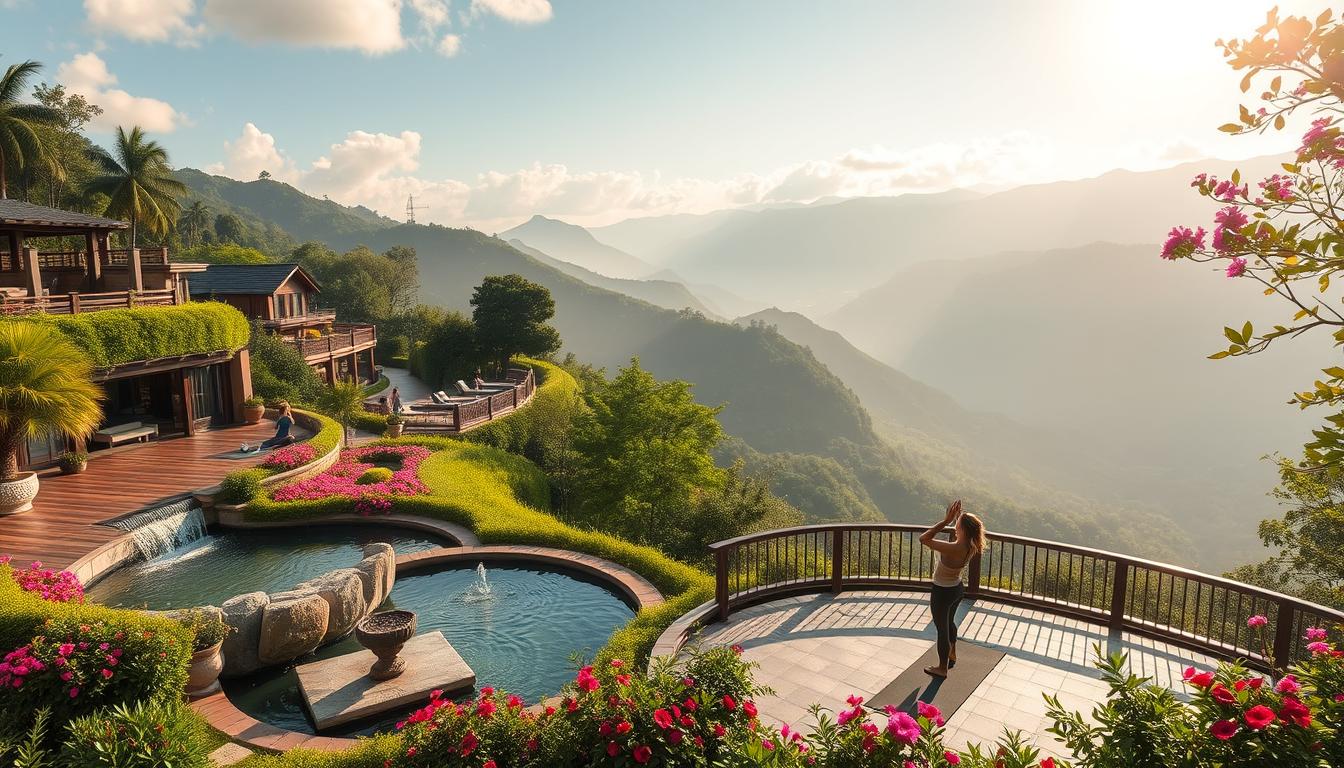Imagine stepping away from your daily routine. You breathe in an experience that makes you feel new. This journey is wellness tourism, a path to health that uses old and new ways.
Picture yourself in Iceland’s Blue Lagoon, surrounded by warm water. Or in India, finding peace through yoga. These moments are more than just photos. They mark your path to a better life.
Wellness tourism is a journey of self-discovery. You spend time exploring cultures that value health. Every step, from fitness to meditation, brings you closer to being your best self. Let yourself be changed by this journey, designed to rejuvenate you fully.
Key Takeaways
- Wellness tourism connects you with health practices from all over.
- It offers spa retreats and fitness adventures, healing and challenging your body.
- Places like Iceland and India provide special experiences, improving your health.
- Transformative travel makes wellness a part of your vacation, refreshing your mind and body.
- By going on wellness trips, you help spread health awareness and support tourism.
What is Wellness Tourism?
Have you thought about making your holiday a journey that makes you feel better? Wellness tourism is all about that. It’s a way to travel that improves your health and mind, not just relax.
This travel style is growing fast. It combines health travel, holistic travel, and wellness vacations. You can find wellness retreat centers to help you.
Defining Wellness Tourism
Wellness tourism means traveling to get better or stay well. It’s not just a break. It’s about making your life better through health activities.
These activities include spa treatments and meditation. They help your mind and body feel good.
The Evolution of Wellness Travel

Wellness travel has been around for a long time. Ancient people used natural springs for health. Now, we have many modern health activities.
Wellness centers are now a big part of the travel industry. More people want to focus on their health after the pandemic.
Benefits of Choosing Wellness Tourism
Choosing a wellness vacation helps you feel better. It’s great for stress relief and improving health. You can also learn about different cultures.
Wellness travel offers many benefits:
- Stress Reduction: Places focused on wellness can make you feel less stressed.
- Cultural Exchange: Many centers share local traditions, letting you connect with cultures.
- Health Improvement: Yoga, meditation, and healthy food can make you healthier for a long time.
This way of traveling makes you feel better and inspires a healthy lifestyle. Wellness tourism is a smart choice for your health.
The Historical Roots of Wellness Travel
Wellness travel has deep roots in history. It combines spa tourism, health retreats, ancient healing practices, and thermal baths. This mix has shaped today’s wellness travel, starting with ancient Greeks and Romans.
Ayurveda, from 3000-1500 BC, focused on body, mind, and spirit balance. Traditional Chinese Medicine also emerged around 3000-2000 BC. These ancient systems support physical, mental, and spiritual health, laying the foundation for wellness tourism.
In the West, spa towns emerged in the late 1500s. By the 1790s, Homeopathy was introduced. But wellness as we know it today began in the mid-20th century, thanks to Halbert L. Dunn’s “high level wellness” concept in the 1950s.
The late 20th century to the 21st saw wellness travel grow fast. The world’s first wellness center opened in the 1970s. Global workplace wellness and spa industries also flourished.
| Timeline | Event |
|---|---|
| 3000 – 1500 BC | Development of Ayurveda |
| 3000 – 2000 BC | Rise of Traditional Chinese Medicine |
| 1650s | Earliest use of the word ‘wellness’ |
| 1790s | Development of Homeopathy |
| 1950s | Introduction of ‘high level wellness’ |
| 1970s | Opening of the world’s first wellness center |
| 1980s – 2000s | Growth of workplace wellness and spa industries |

Learning about wellness travel’s history makes your next retreat or spa trip more special. It connects you to a long tradition of improving human well-being. When you try traditional therapies, you join a journey of health and wellness that’s both historical and ongoing.
Different Types of Wellness Tourism
Wellness tourism offers many ways to refresh your body, mind, and soul. You can choose from holistic travel or specific wellness retreats. Knowing your options helps plan your perfect getaway.

Spa and Detox Retreats
Spa breaks are key for holistic travel, focusing on detox and relaxation. They offer massages, facials, and aromatherapy to remove toxins and reduce stress. These retreats are popular for their quick rejuvenation effects, making them a big part of wellness tourism.
Yoga and Meditation Getaways
Yoga and meditation retreats are great for spiritual and physical balance. They take place in peaceful settings. Here, you can learn yoga and meditation to improve flexibility, clear your mind, and feel emotionally stable.
Adventure and Fitness Journeys
Adventure and fitness journeys mix exercise with exploring new places. They’re perfect for those who love active wellness. Activities like hiking and water sports keep you fit while enjoying nature.
Healthy Eating and Nutrition Retreats
Healthy eating retreats teach the importance of diet in wellness. They offer cooking classes and workshops on nutrition. You’ll learn how to eat healthy at home.
| Year | Value ($ Billion) |
|---|---|
| 2012 | 439 |
| 2023 | 830 |
In 2022, there were 819.4 million wellness trips worldwide. This shows how much people love wellness tourism. It’s growing fast, with more options for travelers looking to improve their health and well-being.
Top Wellness Destinations Around the Globe
Thinking about your next trip to feel better? Look at these top wellness spots. They offer rest, recovery, and a deep dive into local culture. Places like Blue Lagoon in Iceland and Rishikesh in India are special. They help your soul and body feel new again.
Embracing the Heat in Iceland’s Blue Lagoon
Picture yourself in the warm waters of Blue Lagoon in Iceland. It’s surrounded by snow and lava. This place is great for your skin and has amazing views. It’s perfect for those who love nature and wellness.
Yoga and Spirituality in India
Rishikesh in India is a spiritual haven. It’s known as the ‘Yoga Capital of the World.’ Here, yoga and meditation are part of daily life. It’s a place where people grow spiritually and find wellness.
Eco-Friendly Wellness in Costa Rica
The Nicoya Peninsula in Costa Rica is special. It’s known for people living long, healthy lives. Wellness here means fresh food, nature walks, and caring for the planet. It’s good for you and the earth.
Thailand’s Holistic Healing Practices
Thailand is more than beautiful beaches and history. It’s also a place for wellness. You can try traditional Thai massage, herbal treatments, and mindfulness retreats. It’s a complete wellness experience.

Emerging Trends in Wellness Tourism
The wellness tourism industry is growing fast. It meets new needs from travelers wanting to improve their lives. Now, there’s more focus on family wellness, recovery retreats, and wellness for men.
Wellness with Kids: A New Family Tradition
Wellness vacations for families are now popular. They mix fun with learning and relaxation. This way, the whole family can enjoy yoga, meditation, and hikes together.
Recovery Retreats: Beyond Sports
Today, recovery retreats are more common. They help with physical and mental burnout. Guests get sleep tips, nutrition advice, and stress management.
Seeking Calm: Mental Wellness Escapes
Mental health is now a big part of wellness tourism. Places offer calm settings for stress relief. Activities include meditation and therapy to clear the mind.
Wellness for Men: A Growing Demographic
Men are now getting more wellness options. Wellness for men focuses on fitness, mental strength, and nutrition. It’s all about helping men stay healthy and balanced.
The wellness tourism trends are changing. They offer more choices for everyone. This includes mental, physical, and emotional healing in travel.
| Year | Global Wellness Tourism Market Size | Average Spend per Wellness Tourist |
|---|---|---|
| 2022 | $868 billion | $1,764 |
| Projected 2027 | $1.4 trillion | Expected to Increase |

Integrating Wellness into Your Travel Plans
Wellness tourism is changing how we travel. It makes our trips better for our minds and bodies. Knowing about wellness trends helps pick the best vacation.
The wellness travel market is huge, over $639 billion. People want special wellness experiences in their trips now.
Choosing the Right Type of Wellness Retreat
Choosing a wellness retreat is important. Think about what you want to get from it. Do you want to relax, get fit, or meditate?
For example, if you want to relax, try cozy cabin retreats or beach resorts. If you want to get fit, look for places with hiking or yoga.
Preparing for a Wellness Vacation
Getting ready for a wellness vacation is more than packing. Set health goals and pick a place that fits them. Think about what activities you want, like yoga or surfing.
Also, pick a place with good amenities. Look for places with nutritionists, fitness experts, or spas.
Here’s how to choose the best wellness vacation:
| Aspect | Consideration | Benefits |
|---|---|---|
| Location | Choose environments that promote relaxation or activity, depending on your goals. | Aligns with personal health and wellness goals. |
| Activities | Look for locations with activities that fit your wellness needs. | Improves physical and mental health. |
| Amenities | Make sure your place has wellness-focused amenities. | Helps with a full wellness experience. |
| Travel Goals | Know what you want – relaxation, fitness, adventure, or spirituality. | Makes your trip meaningful and fulfilling. |

Knowing wellness tourism trends helps plan better trips. It makes sure your vacation is good for you and the planet.
Wellness Tourism: Stories of Transformation
In the world of health travel experiences, personal stories are very powerful. Imagine spending days at a beach resort with yoga and Ayurvedic treatments. Or think about the spiritual changes during a meditation retreat in Bhutan. These wellness journeys are what travelers remember long after they get home.
Transformative travel is getting more popular. Places known for wellness are attracting more visitors. From the Maldives to Rishikesh, wellness tourism is full of stories of personal growth and discovery.

Wellness tourism is growing fast. More places are adding wellness programs. Now, you can find everything from stress relief to holistic therapies to help your body, mind, and spirit.
Every person’s story is different, but the core is the same. Wellness tourism helps people see life and health in a new way. It’s not just about relaxing. It’s about finding energy and learning more about yourself through fun activities.
| Location | Preferred Activities | Notable Benefits |
|---|---|---|
| Bhutan | Meditation, Spiritual Tours | Spiritual growth, Mindfulness |
| India | Yoga, Ayurvedic Treatments | Physical and mental rejuvenation |
| Maldives | Personalized Wellness Programs | Stress relief, Personal fitness |
Bhutan and India are getting more attention for wellness tourism. Over 70% of Bhutan’s people practice mindfulness every day. Travelers get to experience health and culture, making their health travel experiences even more special.
These trips can change your life. Wellness tourism is full of stories of people finding wellness and happiness. It shows how travel can change how we see health and life.
How Wellness Tourism Benefits Local Communities
The rise of sustainable wellness tourism brings big economic benefits. It also enriches cultural wellness interactions. This is key for places all over the world. More travelers want real and health-focused experiences. This helps local economies and cultures a lot.
Economic Impacts on Local Economies
Wellness tourism is a big win for local economies. It creates jobs in places like spas and yoga centers. This helps people work and grows the economy.
It also makes places better by building eco-friendly places to stay and wellness centers. This helps the construction industry too.
| Aspect | Impact |
|---|---|
| Job Creation | Increases employment across hospitality, wellness, and retail sectors |
| Infrastructure | Promotes the building of sustainable retreat and wellness facilities |
| Local Revenue | Enhances spending on local goods and services associated with wellness practices |
| Cultural Promotion | Boosts visibility and engagement with local traditions and crafts |
Wellness tourism also helps the economy a lot. Places like Costa Rica grow their economy with sustainable wellness practices.

Cultural Exchange and Preservation
Wellness tourism is more than just money. It helps keep local traditions alive. Visitors get to see real cultural experiences.
By talking with locals, tourists learn a lot. This helps keep traditions alive for the future. It’s a win-win for everyone.
This mix of tourism and culture is special. It teaches both sides and builds respect. Wellness tourism is key for keeping cultures alive and growing.
Conclusion
Going on a wellness travel journey is more than a quick break. It’s a deep promise to care for our whole well-being. We’ve seen how wellness travel mixes calm, adventure, and finding oneself while traveling the world.
Every spa visit, meditation, and deep breath in nature helps us grow and heal. The rise in wellness tourism shows our society wants to focus on health, happiness, and peace.
Money signs show wellness tourism is growing fast. It’s expected to reach USD 2,336.34 billion by 2031, growing 12.42% each year. This growth shows we all want calm and healing travel experiences to find balance and energy.
Places like Bali, Costa Rica, and Switzerland are key spots for this movement. They offer places where our journey to better health can grow.
The sector’s bright future comes from a shift in what we value. We now focus on well-being across all ages and places. More people choose special retreats for yoga, meditation, and nature adventures.
Big hotels and resorts like Four Seasons and Marriott lead the way. They help us live wellness, not just experience it. Traveling to improve our well-being means finding the best version of ourselves.


